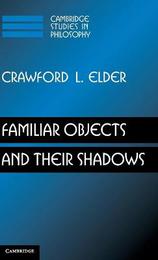
|
Familiar Objects and their Shadows
Hardback
Main Details
| Title |
Familiar Objects and their Shadows
|
| Authors and Contributors |
By (author) Crawford L. Elder
|
| Series | Cambridge Studies in Philosophy |
|---|
| Physical Properties |
| Format:Hardback | | Pages:222 | | Dimensions(mm): Height 224,Width 145 |
|
| Category/Genre | Philosophy - metaphysics and ontology |
|---|
| ISBN/Barcode |
9781107003231
|
| Classifications | Dewey:111 |
|---|
| Audience | | Professional & Vocational | |
|---|
| Illustrations |
Worked examples or Exercises; 5 Tables, unspecified
|
|
Publishing Details |
| Publisher |
Cambridge University Press
|
| Imprint |
Cambridge University Press
|
| Publication Date |
27 January 2011 |
| Publication Country |
United Kingdom
|
Description
Most contemporary metaphysicians are sceptical about the reality of familiar objects such as dogs and trees, people and desks, cells and stars. They prefer an ontology of the spatially tiny or temporally tiny. Tiny microparticles 'dog-wise arranged' explain the appearance, they say, that there are dogs; microparticles obeying microphysics collectively cause anything that a baseball appears to cause; temporal stages collectively sustain the illusion of enduring objects that persist across changes. Crawford L. Elder argues that all such attempts to 'explain away' familiar objects project downwards, onto the tiny entities, structures and features of familiar objects themselves. He contends that sceptical metaphysicians are thus employing shadows of familiar objects, while denying that the entities which cast those shadows really exist. He argues that the shadows are indeed really there, because their sources - familiar objects - are mind-independently real.
Author Biography
Crawford L. Elder is Professor and Head of the Philosophy Department at the University of Connecticut.
Reviews"....Familiar Objects and their Shadows is an exciting and ambitious book, and Elder takes the best current arguments in the field and takes them forwards." --George Lazaroiu, PhD, Institute of Interdisciplinary Studies in Humanities and Social Sciences
|